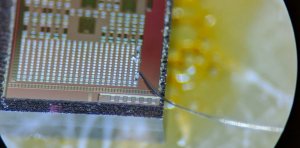Summary
Large-scale, fault-tolerant quantum computation requires precise and stable control of individual qubits. This project will use complementary metal-oxide-semiconductor (CMOS) technology to provide a cost-effective scalable platform for reliable and high-density control infrastructure for silicon spin qubits. We will use sub-micron CMOS technology to address device and circuit-level challenges and explore the integration of classical CMOS and quantum computing components. Since spin qubit control and measurement requires CMOS to operate at milli-Kelvin temperatures – far below the normal operating range of classical electronic devices – we will develop and calibrate compact models for MOSFETs at cryogenic temperatures, considering electrical, thermal and noise behaviors. These models will be used for cryo-CMOS design for spin qubit control operations, data readout, and communication, in a compact and scalable way at the node level. We hope to eventually implement integrated, readily scalable spin qubit control systems by bridging the classic CMOS and quantum platforms.

Figure 1. 65nm test chip for cryogenic device characterization
Related Content

Free-space Polarization-selective Microcavity based on Chiral Metasurfaces
Summary Developing a new type of Fabry-Pérot cavity that allows improved control of the atoms’ emission into the cavity mode will result in enhancement of the efficiency and fidelity of quantum state transfer from photons to atoms and back. This in turn can be used to improve the performance of quantum networks and repeaters, as […]
September 19, 2019

Topological Properties of Exciton-Polaritons in a Kagome Lattice as a Solid-state Quantum Simulator
Summary In this project, we build a solid-state quantum simulator for engineering a specific Hamiltonian. Quantum simulators are purpose-built devices with little to no need for error correction, thereby making this type of hardware less demanding than universal quantum computers. Our platform consists of exciton-polariton condensates in multiple quantum-wells sandwiched in a semiconductor Bragg […]
December 8, 2018

Quantum Simulations of Fundamental Interactions
Summary To address questions in modern physics such as “what is the structure of matter inside neutron stars?” we need better computational methods to evaluate the interplay of fundamental forces between elementary particles. To-date the response to such questions rests on numerical computer simulations that are inherently limited. In this project, we develop new theoretical […]
April 18, 2019

Silicon Platform for Electron Spin Qubits
Summary Scaling solid-state quantum processors to a useful threshold while maintaining the requisite precision in quantum control remains a challenge. We propose a quantum metal-oxide-semiconductor (QMOS) architecture operating at cryogenic temperatures that is based on a network/node approach as a means to scalability. By working with QMOS, we benefit from the deep investments and […]
December 7, 2018

